
This is going to be a unique article for us in that this is more of a showcase and not a review. This sample was paid for out of pocket and like all our articles, will remain unbiased to a fault.
As far as I am aware, there are only two ITX computer case manufactures in the USA (R.I.P. Caselabs), one of them is Sliger Designs out of Sparks, Nevada and the other is System76 from Denver, Colorado. And while System76 both designs and manufactures their own chassis, they are not available for sale without the purchase of one entirely pre-built computer. That might immediately cause some of you to lose interest in this article, but I would urge you to continue reading (or at least stick around to see the pictures) as System76 has made some monumental decisions that I think should be celebrated.
First, let’s take a step back to talk about System76, the company.
System76 is small company of about 40 extremely ambitious hard-core nerds that are dedicated to the open source life. Apart from creating their own computer chassis (using open source software), they also have their very own operating system called Pop!_OS that uses Ubuntu as it’s foundation. Pop!_OS provides a clean aesthetic(Gnome shell) that is heavily geared towards power users —after all, they were one of the first to market with a 3990X desktop. Outside of the case and the operating system, they also sell Clevo/Sager laptops with many of their latest models offering custom open source firmware called Coreboot that enables their laptops to boot to OS in 10 seconds. This team is so crazy that they even have plans to design their very own custom laptop in the near future and on the road to designing a custom PCB layout for this laptop, their team is currently designing a high-end mechanical keyboard due for release later this year. With all this insane ambition, System76 stands among Microsoft and Apple as one of the few companies that distributes their own operating system as well as custom hardware and I think that’s pretty cool!
Now, let’s talk about Thelio, the chassis (https://github.com/system76/thelio).
Thelio desktops are available in multiple wood colors and in three different sizes, from 19.68L with the Thelio, 49.40L with the Thelio Major, all the way up to 67.97L with the Thelio Massive. Each case is made of wood and aluminum sourced from inside the US and they are handbuilt at their own manufacturing facility in Colorado. The Thelio(s) hardware is/are never stagnant as System76 has an iterative design process that changes with requests from their customer-base, so the hardware as well the case itself is ever evolving. For example, when Linus Tech Tips reviewed the Thelio last year, his suggestions were taken to heart and the inefficient Arctic Freezer HSF has since been replaced with a quieter, more effective, Noctua NH-U9S. With every Thelio purchase, they even plant a tree with the National Forest Foundation to help offset their carbon footprint, which I think is awesome! There are several other unique features that set this case apart from the rest too, like an exterior shell can be completely removed and a custom daughterboard called Thelio Io that moves proprietary functionality like fan control, from the mainboard to the daughterboard. The Thelio Massive even includes an open source System76 designed SAS backplane for high performance 2.5” PCIe storage. I think this team is onto something here…
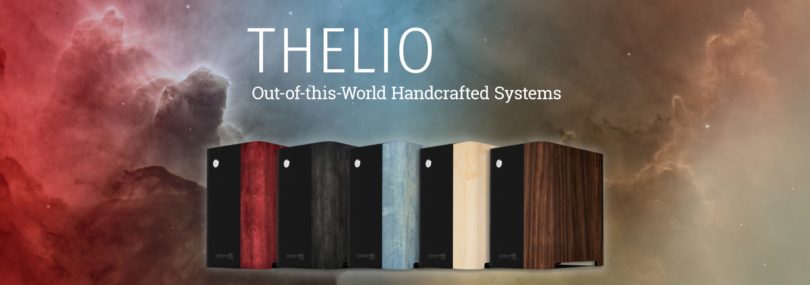
Specifications
| Liters | 19.68L |
| Case Material | Aluminum frame, Aluminum shell with wood veneer. |
| Power supply type | SFX |
| 2.5″ HDD support | 4x SSDs |
| Expansion slots | 2 |
| Total fan mounts | 1 |
| Dust Filters | N/A |
| Front radiator | N/A |
| Top radiator | N/A |
| Rear radiator | N/A |
| Bottom radiator | N/A |
| Cable routing space | Yes |
| Cable routing grommets | Yes |
| Fixed Velcro Straps | Yes |
| Case dimensions (L x W x H) | 327mm x 207mm x 291mm |
| Price | $899-$5233 (AMD) $1,098-$5,467 (Intel) |
Packaging and Contents
Behold! A premium all-colored box! No plain brown box with black ink here! The packaging, while rather simple in it’s shape, looks and feels quite premium on the surface.
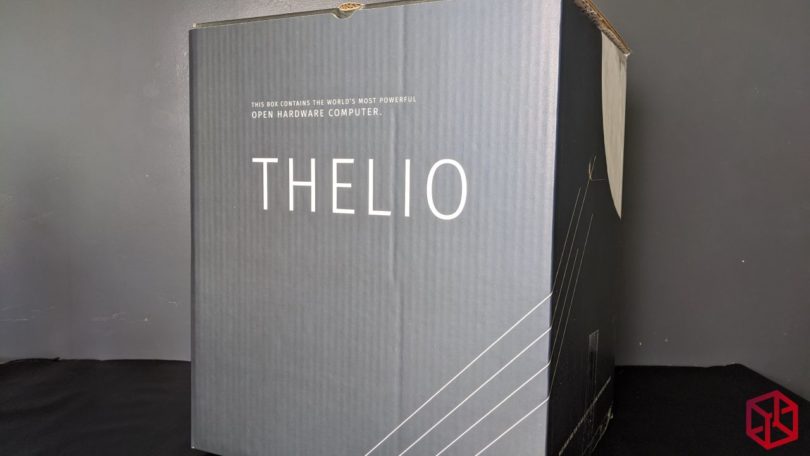
The cardboard packaging is double layered for increased strength and rigidity. This box was shipped inside another double layered cardboard box that was discreet.
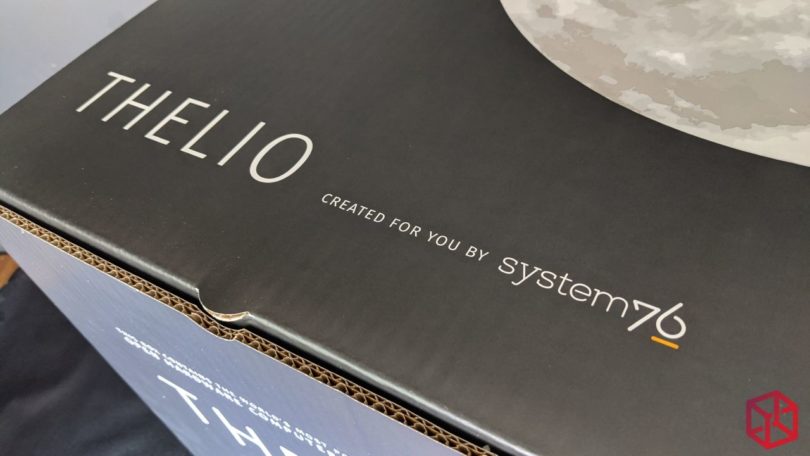
Like their universal quick start guides (which can be found here), the box welcomes everyone from every corner of the universe, to Thelio.
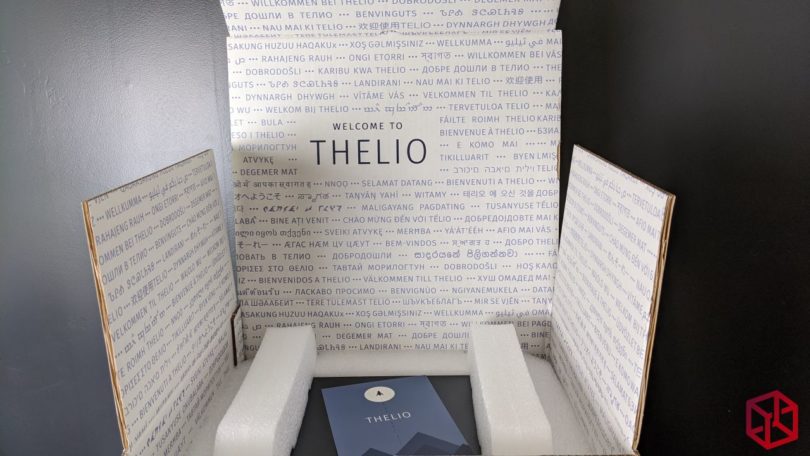

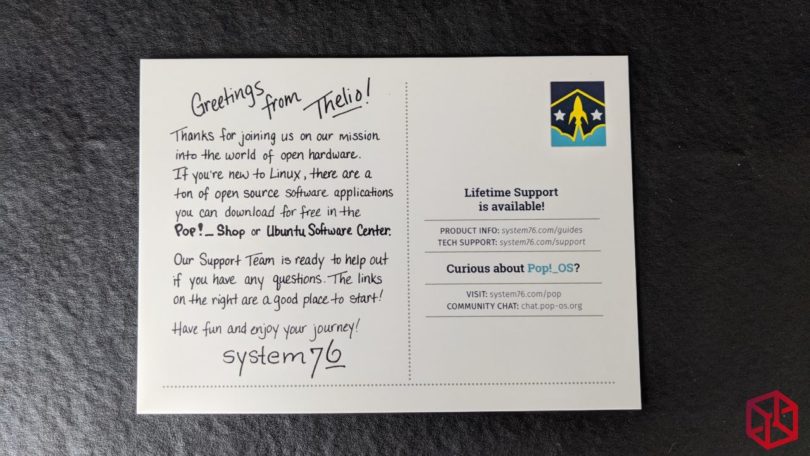
Welcome to Thelio
Before we move on, I just wanted to quickly discuss the postcard above. To better understand why System76 includes a neat little postcard, you would also need to know that System76 worked with another company call Freehive(a creative agency out of Utah) to create a interactive story telling experience for the creation of this case: thel.io
Each interactive chapter has a short video, even going so far to hint at the dangers of closed source. I wasn’t around when the case was nearing release but I would imagine that each chapter was released over time to help build up hype before it was officially unveiled. Either way, that’s a new level of detail that I can appreciate especially when it supports other creatives.
This little detail will also help to explain the unique fan grill that System76 has created for the Thelio.
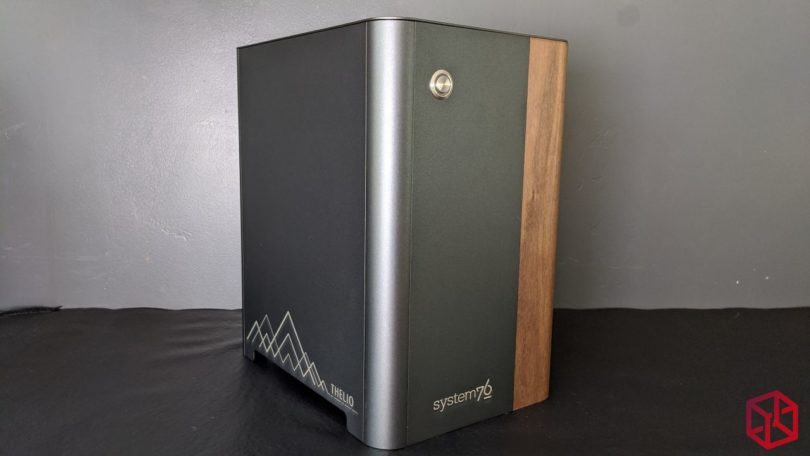
There is no denying that the Thelio is a damn good looking case. I love the color combination.
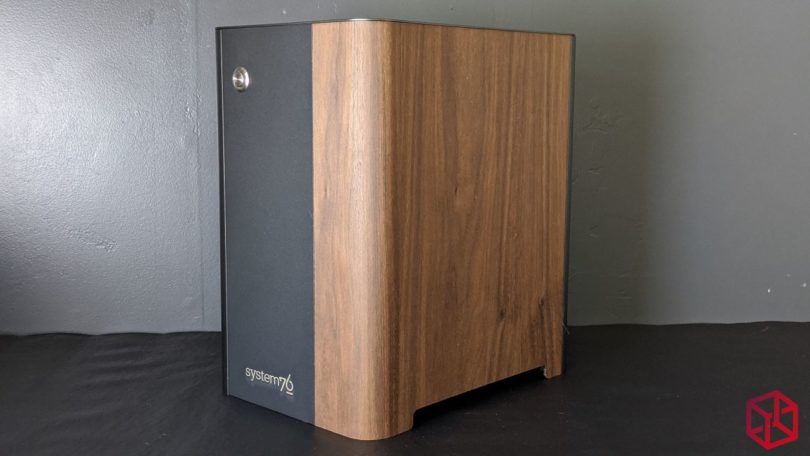
The front and side-panel logos appear to be laser etched through the anodizing. I don’t know the exact terminology for when this issue occurs but it does appear that there was some marring in the area surrounding the laser etchings.
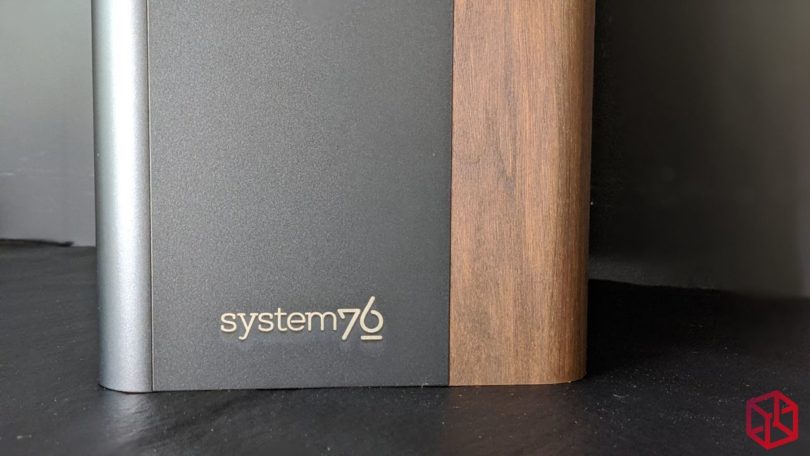
THELIO on th… wait… is that Morse Code I see? Sure enough, that translates to “SYS76” in a Morse translator. That’s a cool little detail!
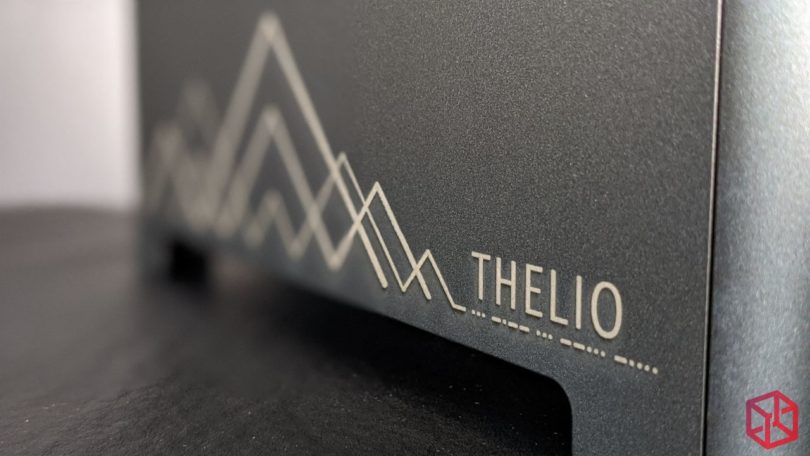
This button, whoa, it feels pretty amazing to press. It feels like a… tactile Zealios switch (or a nice Topre) disguised as a tiny arcade button.
I want one for all my cases now… I’m going to have to find out who makes this so I can buy a bunch. It glows a soft white when the computer is on.
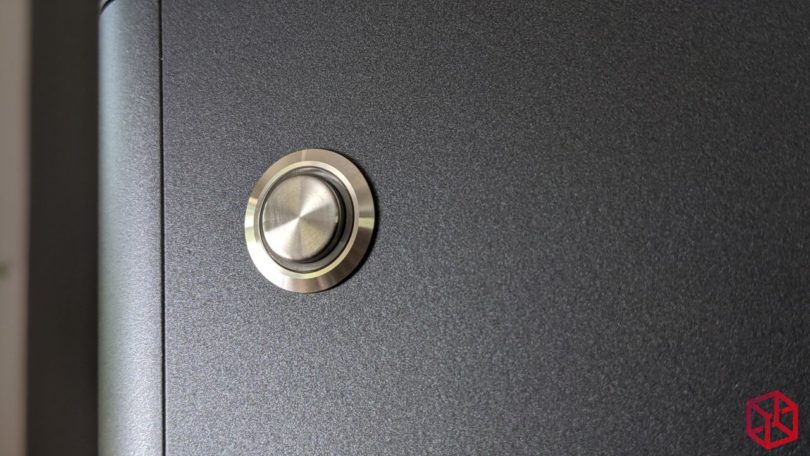
I took this shot so that you too can appreciate the natural wood grain.
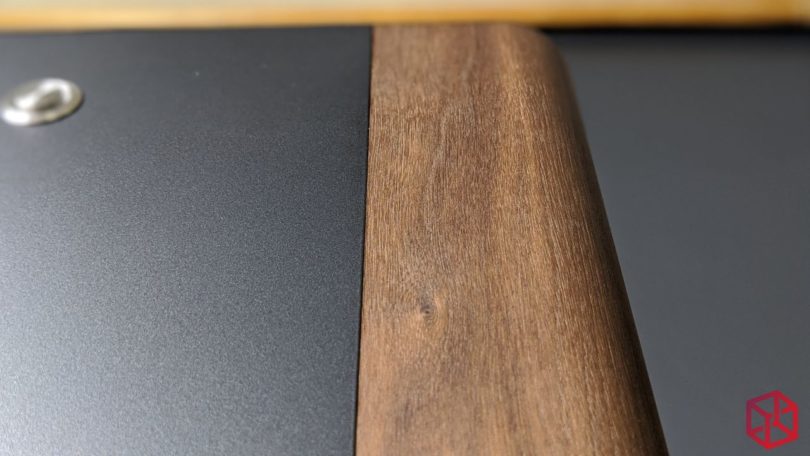
No gaps here!
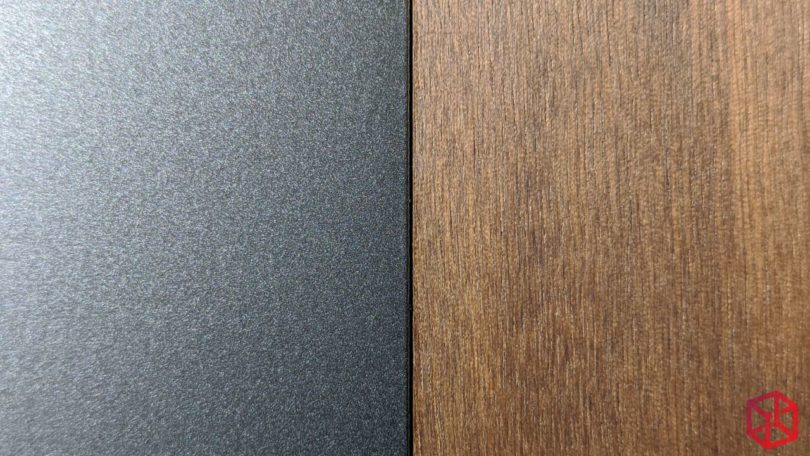
As you will soon see, the included motherboard is a solid choice but just know that you cannot swap it out as there is no motherboard backplate.
The back panel may look different depending on the hardware configuration and the motherboard they include with each AMD or Intel processor.
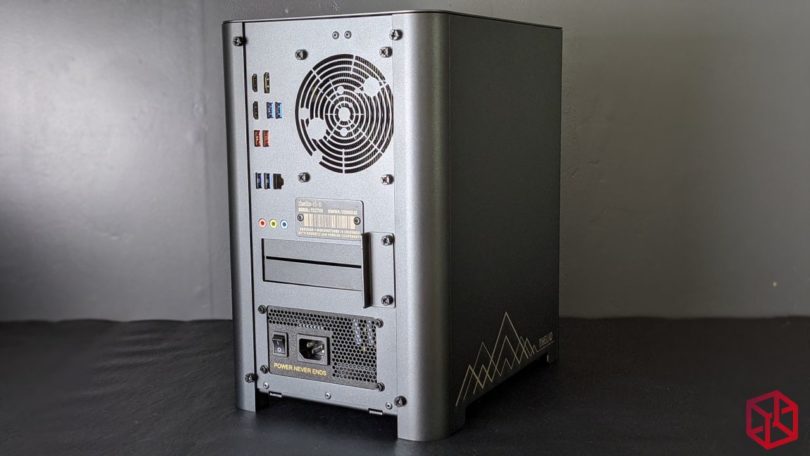
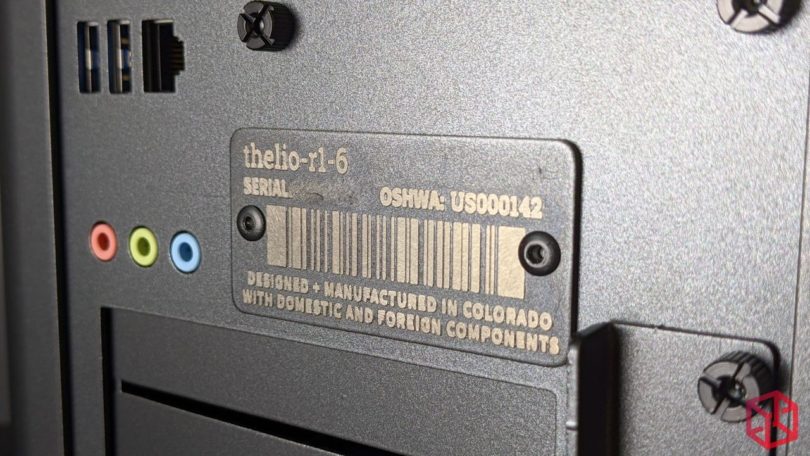
I like the detail that went into designing this fan grill. For the less perceptive out there, it’s our solar system with each ring mapping the orbit of a planet.
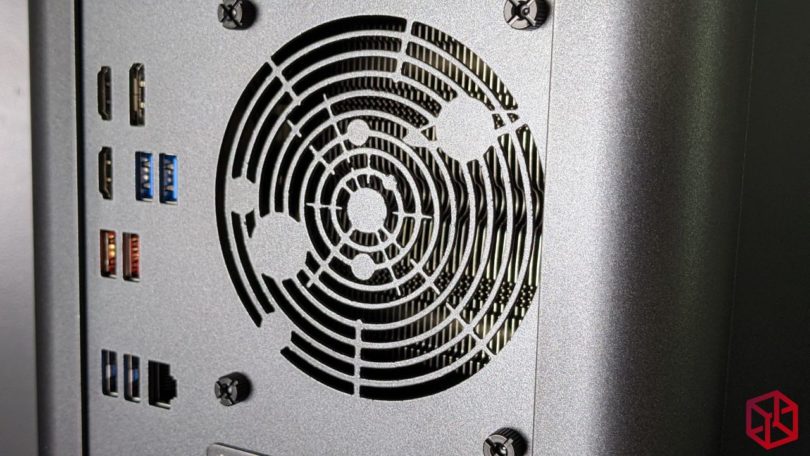
Nobody will see this side but that’s the intake grill. I wish this bottom portion had mounts for a large square dust filter but that’s pretty minor depending on where you plan to put you case (please don’t put it on the floor). This underside is another part of their iterative design process that has been improved since Linus Tech Tips initially reviewed the case. Here, System76 has fully extended the bottom of the case outwards to meet the exterior shell which will help to prevent dust and block internal noise from escaping.
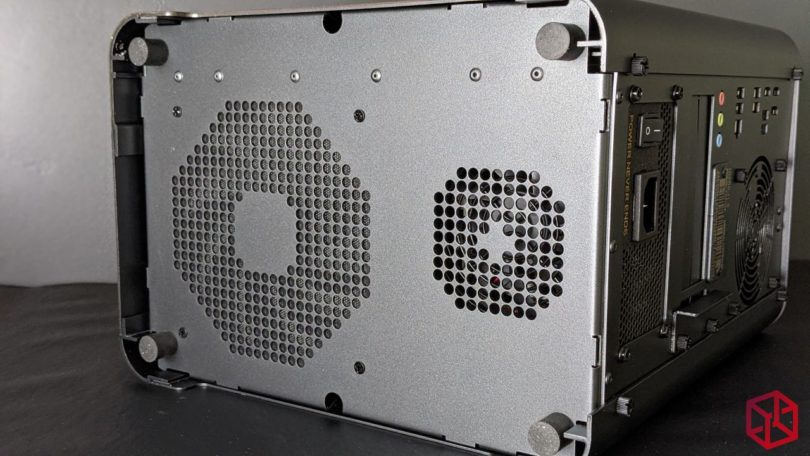
There are 4 super fancy black screws in the back that need to be removed before the case can be opened.
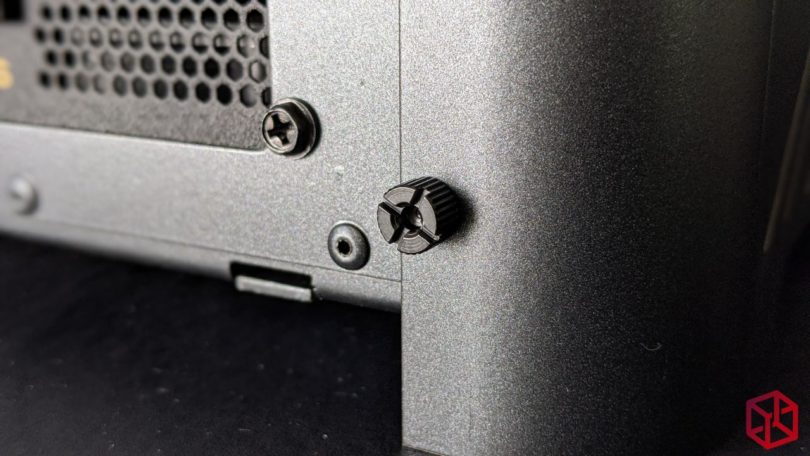
Once they are removed, simply lift up the shell.
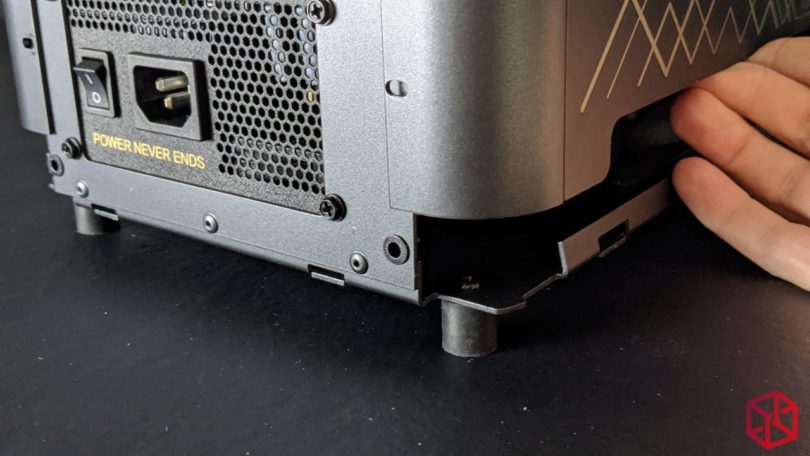
…and then set it aside.
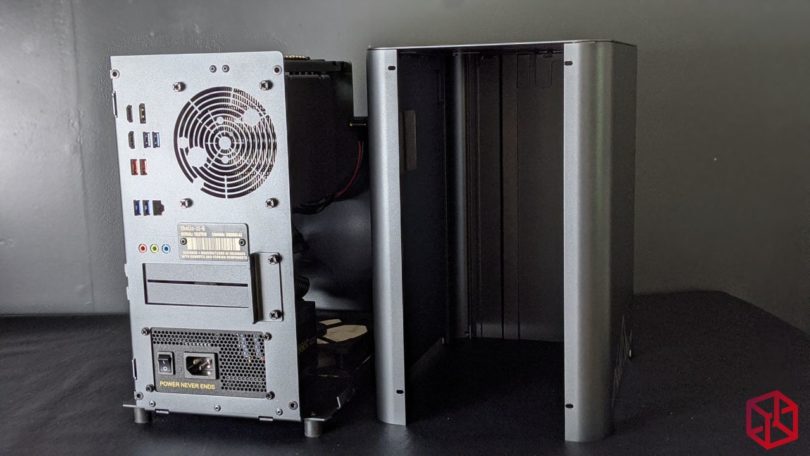
I really like how they designed the power button that is mounted on the inside of the exterior shell.
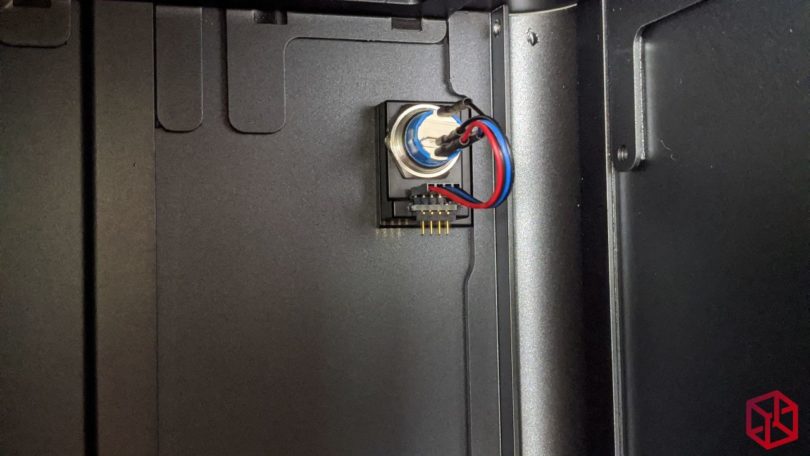
This is how the power button connects to the internal chassis. This is then connected to the Thelio Io daughterboard that I mentioned earlier.
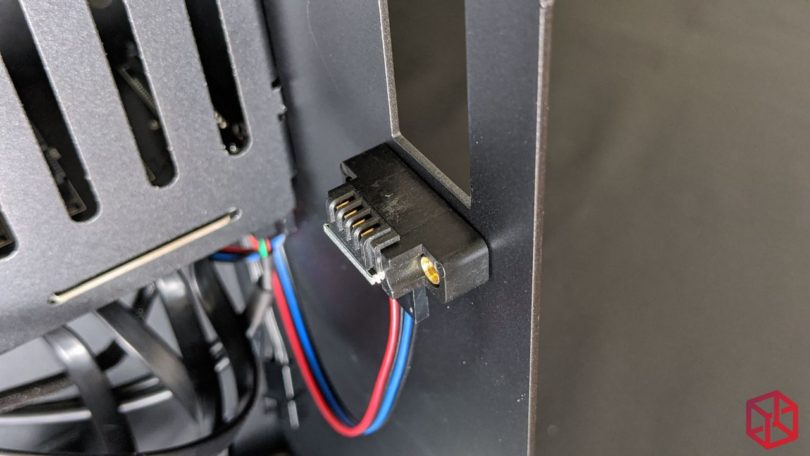
Among the organized cables, there appear to be some custom wireless antennas too. I had to check but it turns out that the exterior shell has no metal near these antennae that would interfere with wireless functionality.
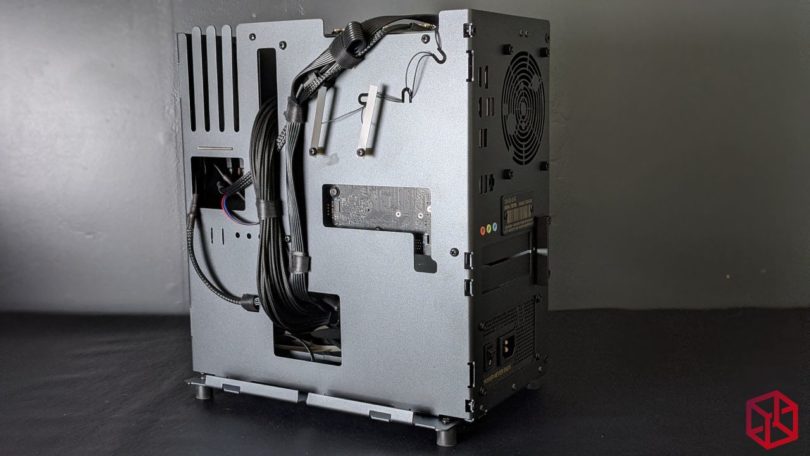
I can and will always appreciate well organized cables. Nicely done!
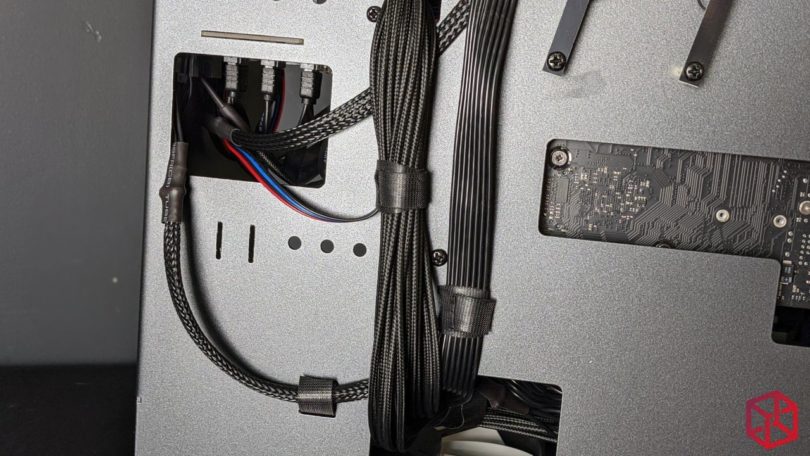
This picture shows where the external frame would rest on the inner frame. You see that thread in bottom left corner just under the PSU? That’s where the outside shell attaches.
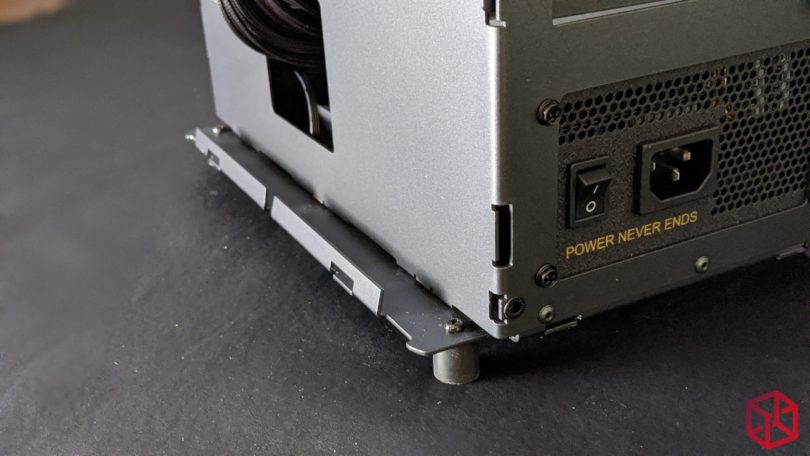
At the top of the case, there is a central rail for chassis rigidity that doubles as a rack to hold all 16 screws in-place should you ever want to add some additional 2.5″ storage, up 22TB worth if your wallet is ready. If you decide to use 2.5″ mechanical drives, they come with rubber grommets to dampen vibration but I guess these grommets could also be uses to protect the anodizing from being marred when mounting the SSDs into place. To remove the screws, simply pull out the black ring at the end of the channel and slide each screw out one-by-one.
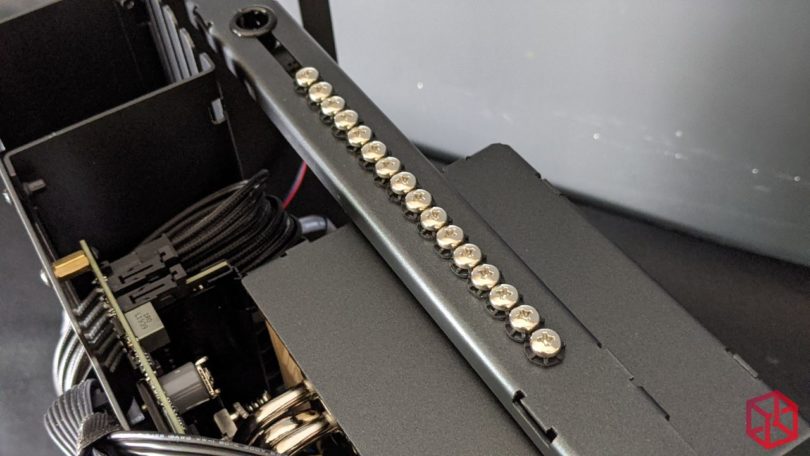
The Thelio I ordered doesn’t include a dedicated GPU but it does include an optional GPU brace and the necessary PCI-E cables to a add a GPU of my choosing.
The intake fan at the bottom is a 140mm 1300RPM ARCTIC F14 PWM fan that uses fluid dynamic bearings for a long quiet service life.
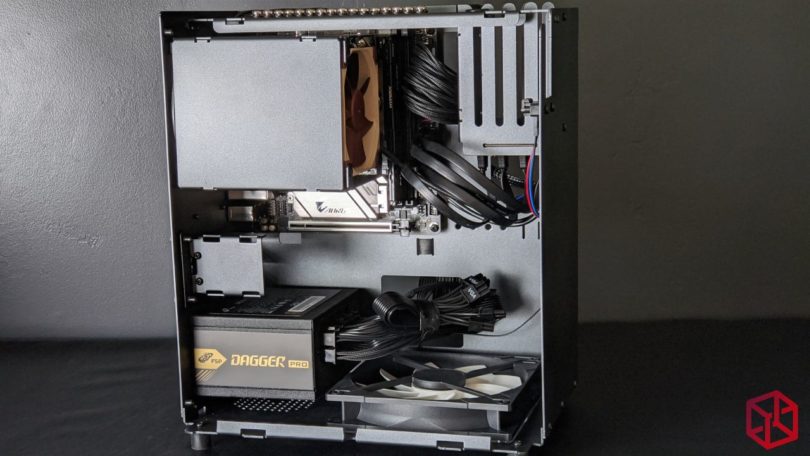
System76 has taken it upon themselves to design a shroud that goes over the Noctua NH-U9S. This helps to guide airflow directly out the back of chassis. There no plastic here either, the shroud is all aluminum and it matches the case beautifully.
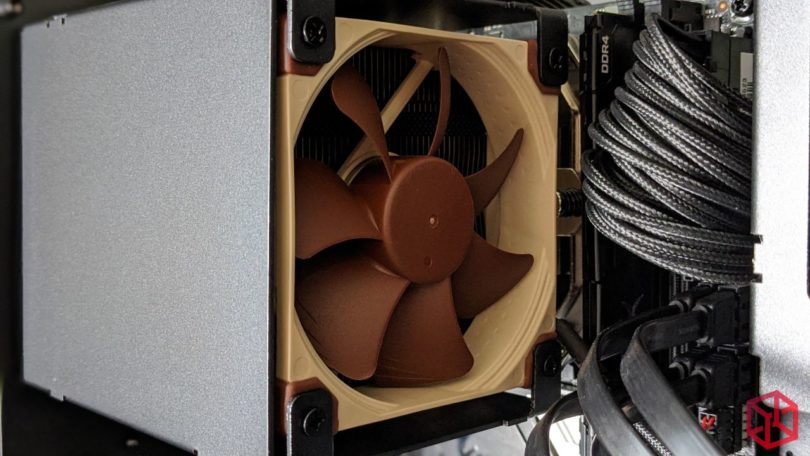
It looks like there is plenty of room for a 2.75 slot GPU too.
The motherboard included with the base model is Gigabyte’s Aorus B450 Pro wifi. I’m not entirely sure if this is the same board they use with the Ryzen R9 3950X configuration but it’s not a bad choice.
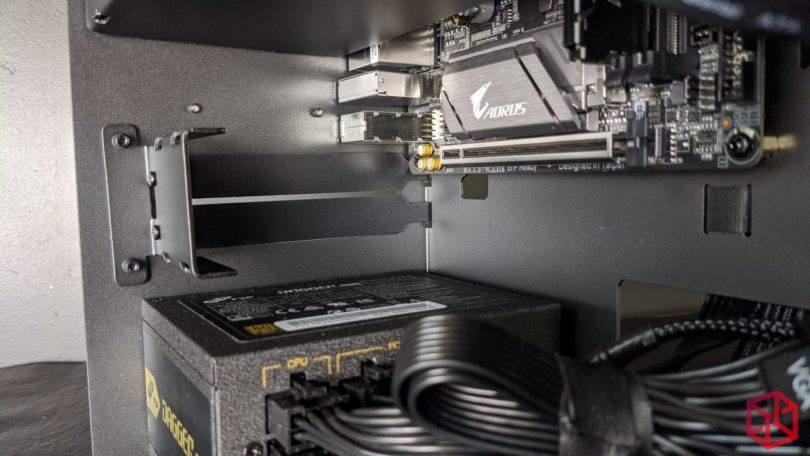
The Noctua NH-U9S sits atop a Ryzen 3200G in this base model.
You can swap out the 3200G for almost any Ryzen processor leading up to the flagship 3950X, oh, and they have Intel versions too.
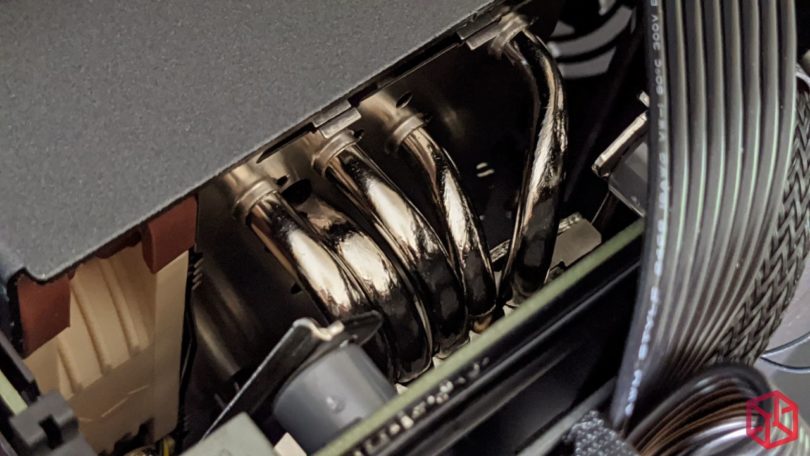
In the base configuration, it includes a single 8GB stick of Kingston’s HyperX FURY DDR4-3200MHz but it can be configured with up to 64GB.
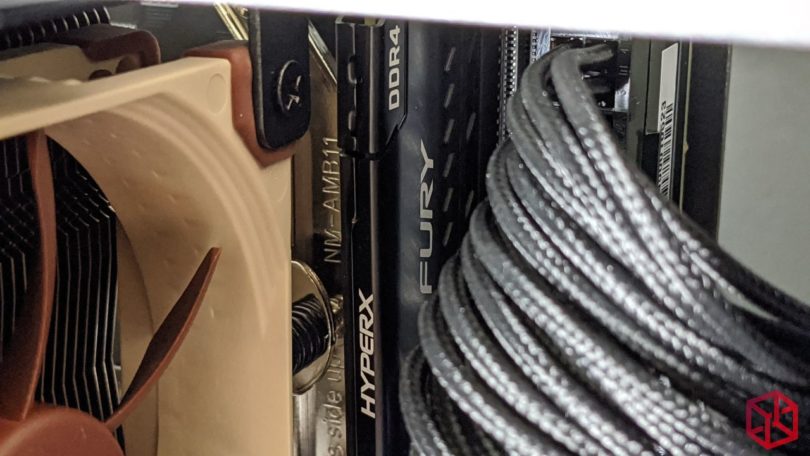
The PSU of choice is FPS’s Dagger Pro 550W. You can check out John review of FSP’s 600W variant here.
This version only supports up to the RTX 2060 in their build configuration but the 650W model unlocks the ability to supports other AMD and Nvidia GPUs up to a 2080TI.
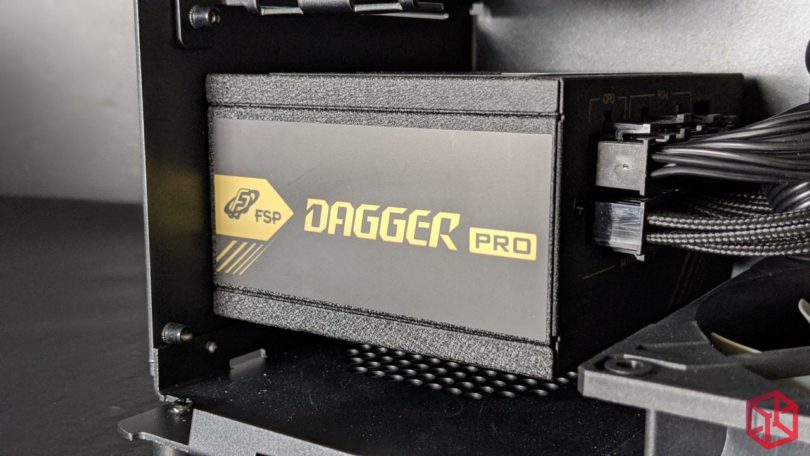
This is Thelio IO daughterboard that I mentioned earlier. It not only connects to 4x 2.5″ SSDs but also controls system fans(using 3x 4-pin PWM headers) based on the temperature of the CPU and GPU. All the files are here if you want to dive deeper into how this works and how it’s designed: https://github.com/system76/thelio
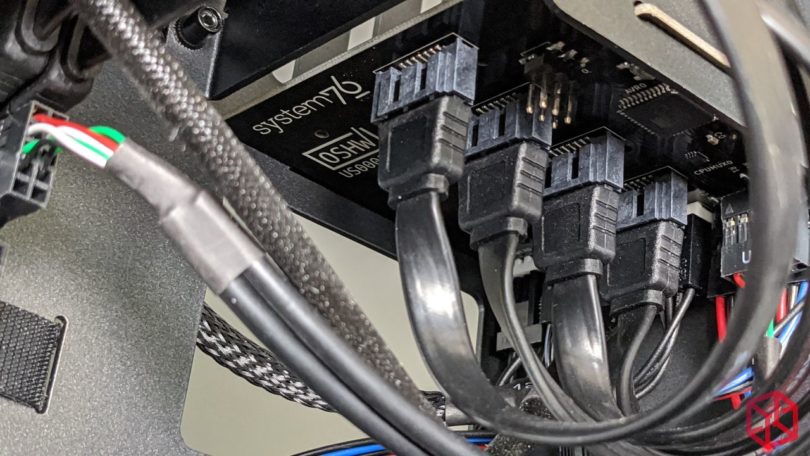
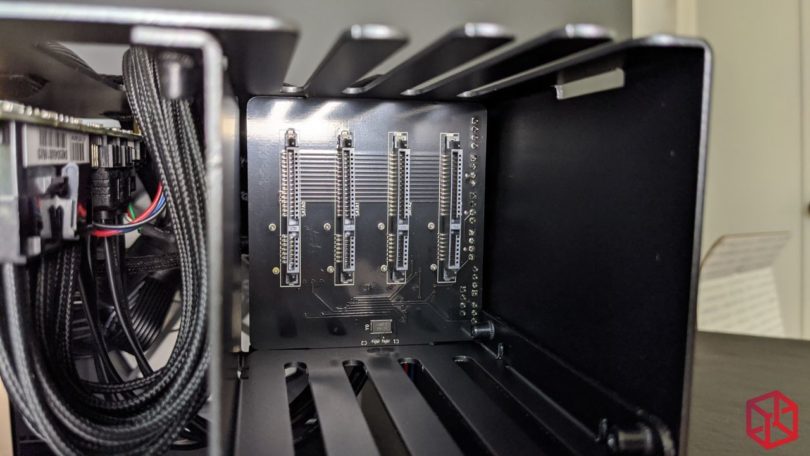
Here is how the Thelio stands next to the 7.2L Dancase A4-SFX.
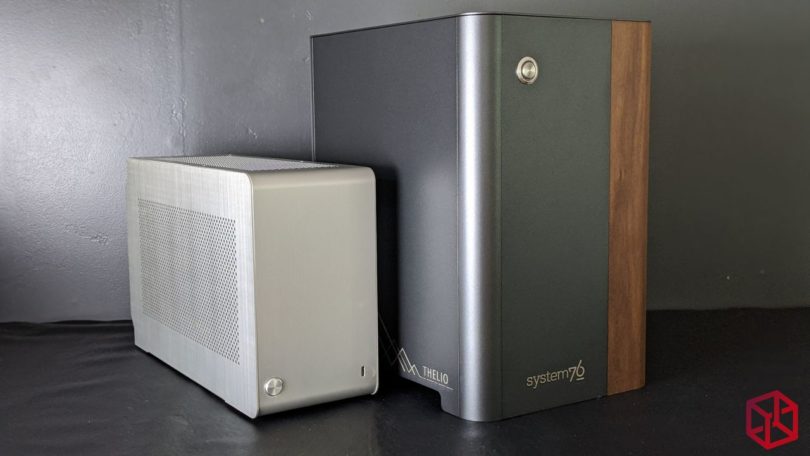
Here is how the Thelio stands next to the 16L Fractal Era that we just reviewed here.
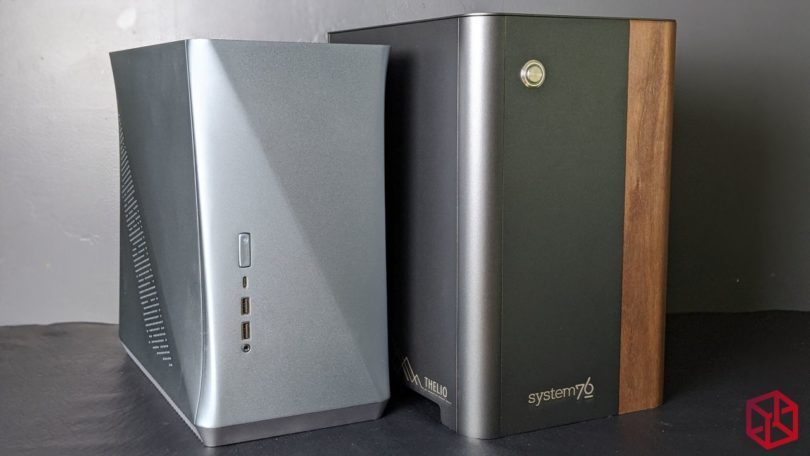
Among it’s peers, I really like the way the Thelio looks. It’s a shame that System76 doesn’t sell this case separately.
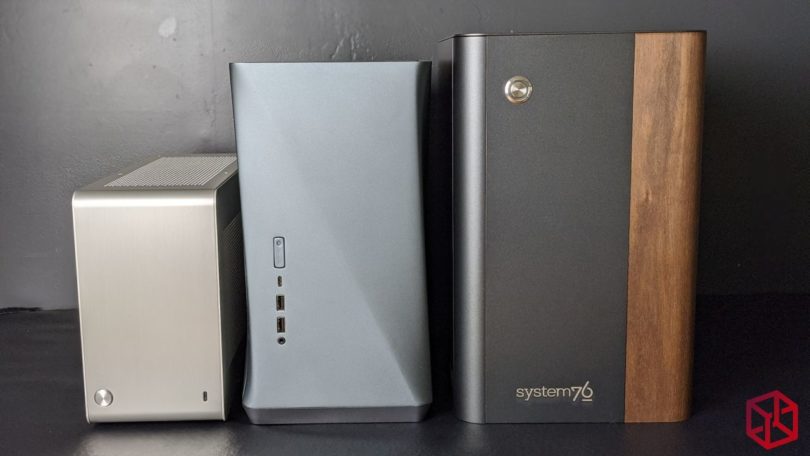
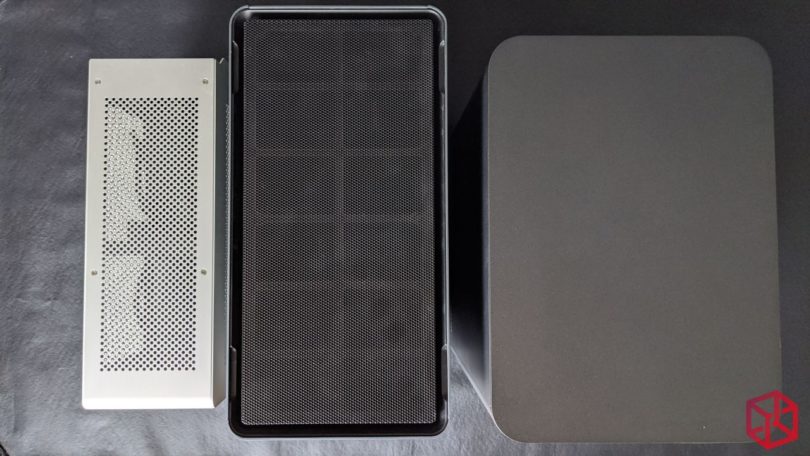
Moving on, there were a few minor manufacturing imperfections that are worth mentioning but they don’t in any way detract from the overall functionality. These are just small things that could be improved upon.
1st. The holes that were cut into the right side of the shell are dangerously thin (non-issue on the other side). This proved difficult to capture on camera but it was thinner than a slice of paper. I was very careful to thread the screws back into position in a way that no outward pressure was being placed on that thin strip of metal.
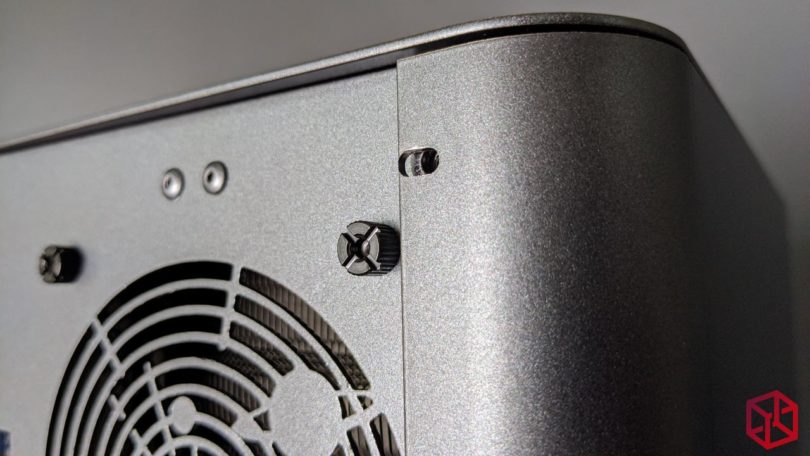
2nd. The top seemed perfectly flat but the part that makes the metal side of the shell(Left) seems to have been manufactured slightly outside of tolerances. This gap wasn’t present on the wood side(Right).
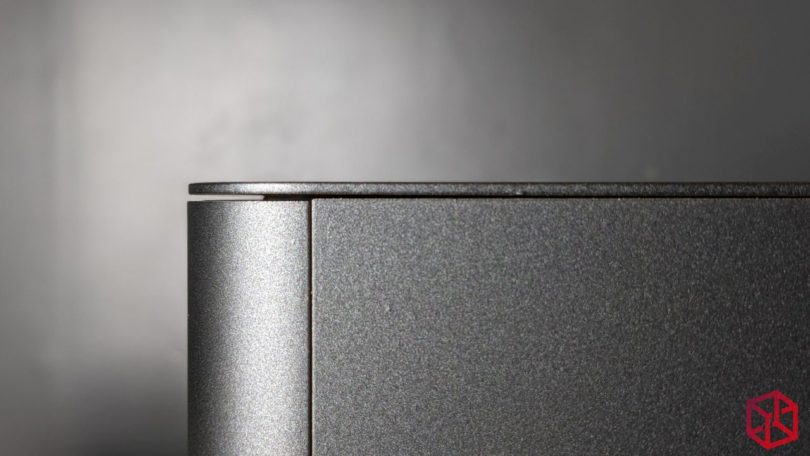
3rd. There was a slight defect in the top panel in the form of a little bump. It’s only present here and nowhere else that I could find. It was tall enough to be felt when running your fingers over the smooth surface but I didn’t want to attempt to scratch it off as it was anodized into the case.
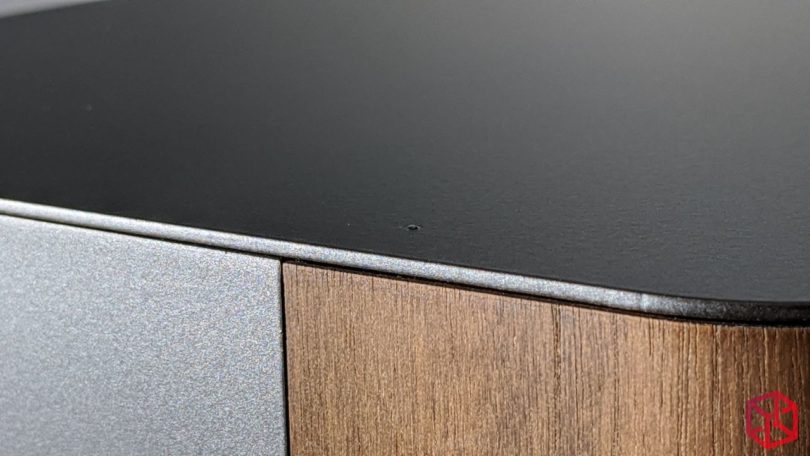
Conclusion
I really like what System76 has created with the Thelio. It’s clear that a lot of outside the box thinking has occurred and there is a lot to love about their design decisions. I absolutely love the power button they have chosen and the two tone color scheme would add beauty to any room (with even more colors to choose from).
Due to US materials and labor costs, their is absolutely a premium cost associated with the build of each Thelio but that price also covers US-sourced materials from other US businesses, the parts & labor warranty, continued OS development (Pop!_OS), lifetime technical support, and a unique chassis you won’t find anywhere else. System76 continues to streamline their manufacturing process to reduce costs and have reduced the cost of the Thelio and Thelio Major by $200 since it’s release.
The price alone for a Thelio wouldn’t stop me from recommending them over the competition (Dell, who also offer’s Ubuntu), especially if you care for the open source hardware and software community that they aim to empower.
My experience has left me curious to see what else their ambitious team will come up and hope you enjoyed the read!
Please let us know what you think about it here on our forums.
Links
System76 website: https://system76.com/
System76 blog: https://blog.system76.com/
Laptops: https://system76.com/laptops
Desktops: https://system76.com/desktops
Mini PCs: https://system76.com/desktops/meerkat
Servers: https://system76.com/servers
Operating system: https://system76.com/pop
